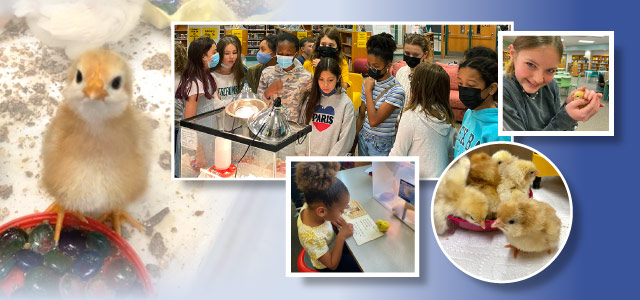
"The chicks are hatching!" For the past several years, the excitement of hatching eggs and welcoming baby chicks has become the talk of the school at several PWCS buildings. The Beginning of Life Embryology project is an interactive, month-long enrichment opportunity offered by Prince William County (PWC) 4-H with support from Virginia Cooperative Extension, Virginia Tech University, and Virginia State University.
This year, the participating schools received 12 fertilized ISA brown chicken eggs, which are considered the best breed for first-time chicken caretakers. Ashley Isaccson, the education and outreach specialist for PWC 4-H, explained, "Embryology teaches students about life science and respect for life as students witness the exciting miracle of life. Students take the responsibilities of caring for the fertilized eggs and the chicks after they have hatched."
The anticipation of hatching grows as students learn the proper way to sit an egg in the incubator and monitor that the incubator maintains the correct temperature and humidity level. A week after receiving their eggs, students can start to candle the eggs to see the baby chicks developing in the shell.
Donna Garzione, third grade teacher at Loch Lomond Elementary School, shared, "The students took turns with the '"chick check.'" They logged their observations in a daily journal. I also included a fact page in the journal for each day."
With three weeks of proper care, sounds of chirping can be heard and students observe as the baby chicks pip their shells, which is an initial crack, then begin to emerge. The newly hatched chicks are moved to a brooder box complete with food, water, and a heater.
As a part of the registration requirements, the staff member at the school in charge overseeing the care of the baby chicks, must attend a training session hosted by the 4-H. The PWC 4-H also provides educational materials that incorporate Standards of Learning (SOLs) for math, life science, English, and computer technology.
Julia Renberg, the supervisor of science and family life education for PWCS, explained, "As with any project-based learning, it takes students beyond reading about the natural world to witnessing and experiencing it first-hand. It also promotes the development of observational, sense-making, and communicative skills that are critical for successful scholarship and citizenship."
The school division's partnership with the PWC 4-H is a great example of how beneficial it is to partner with local and national businesses and nonprofit organizations. Garzione said, "This PWC 4-H enrichment program has been a fantastic community resource. As a teacher, they made it very user friendly. I was grateful for their organization and support."

